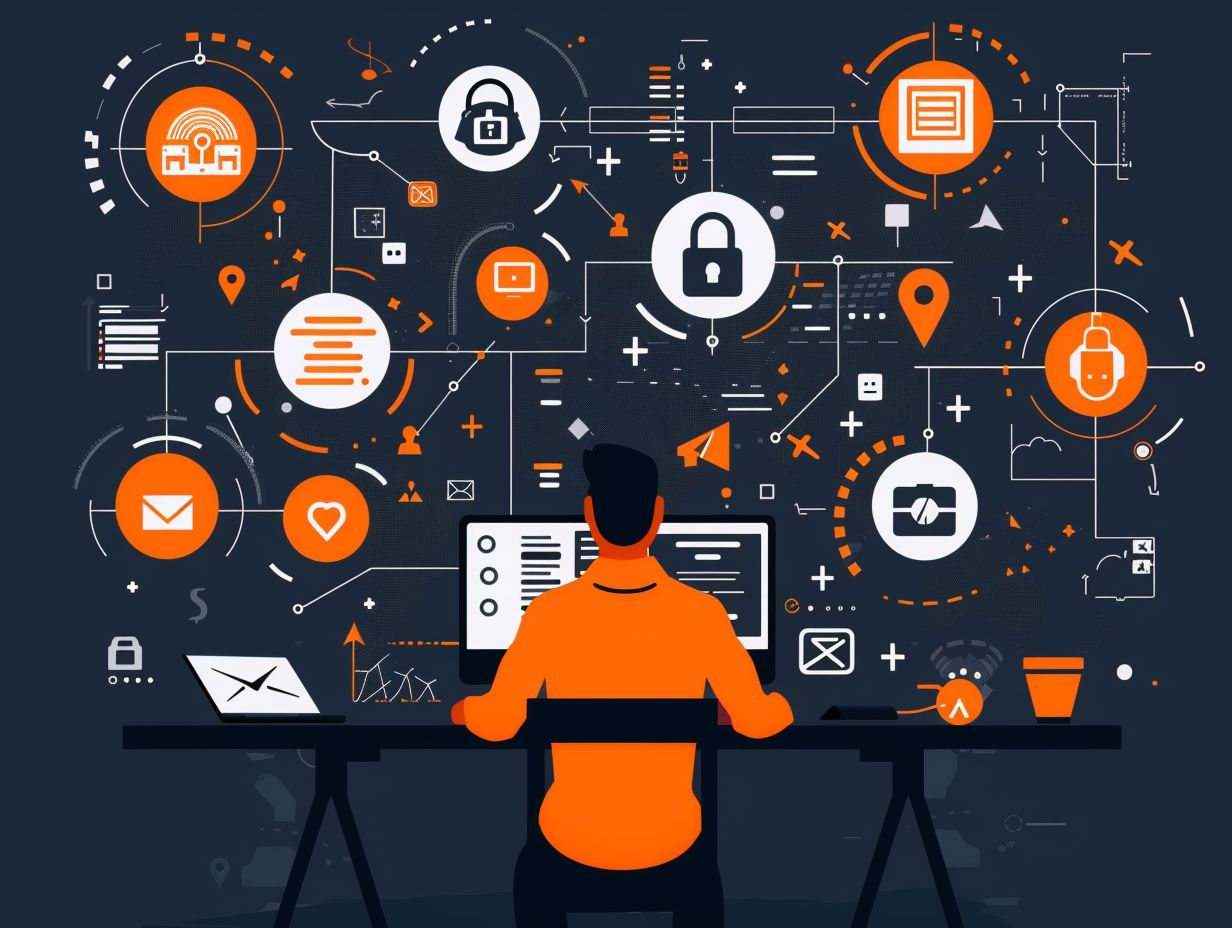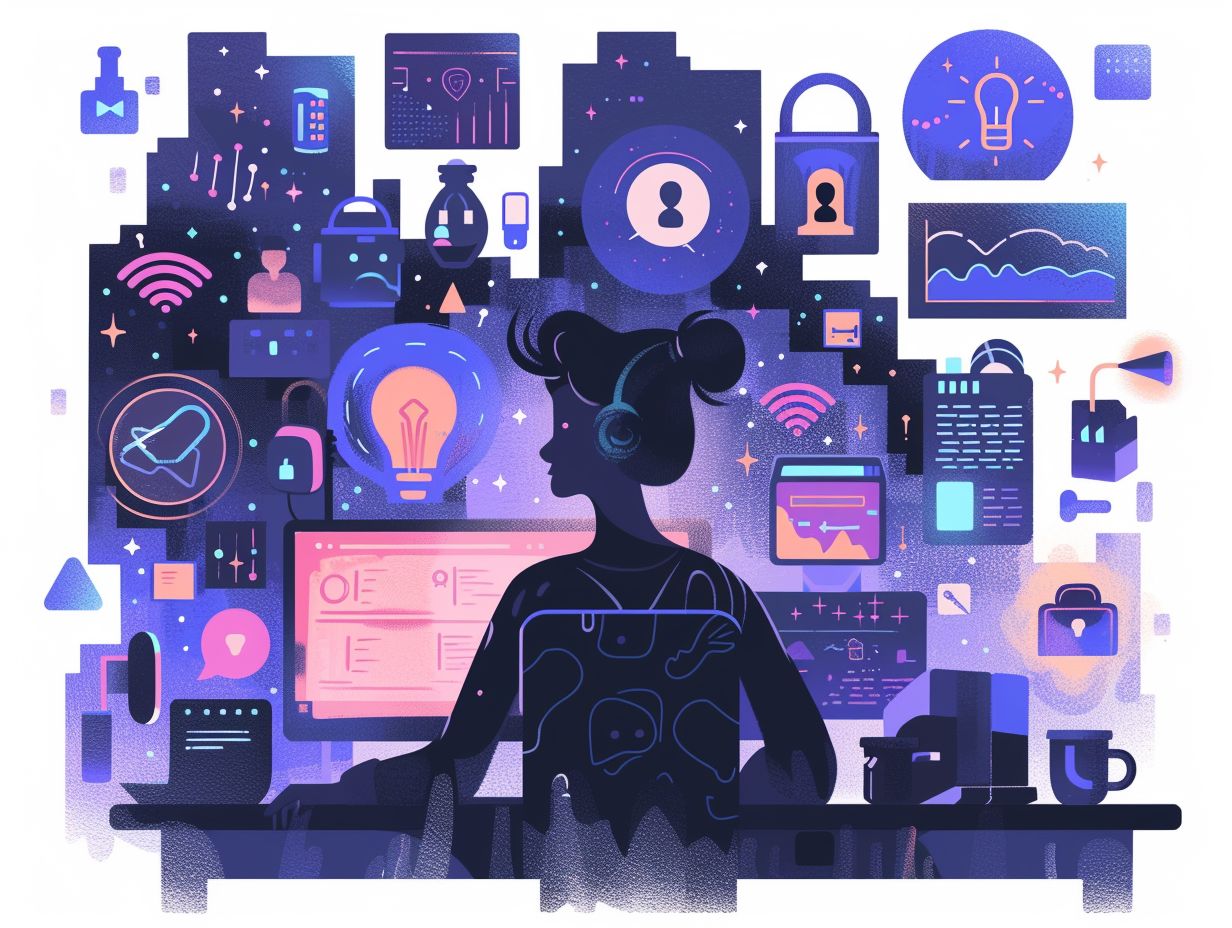In today’s digital age, cybersecurity has become a crucial aspect of protecting sensitive information and ensuring the safety of online platforms.
As a professional in the cybersecurity field, it is essential to recognize the growing demand for cybersecurity professionals and the need to stay informed about the latest trends and technologies. This article delves into the current state of the cybersecurity job market, emphasizes the importance of continuous learning in cybersecurity, explores the various types of learning opportunities available, and highlights the benefits it can bring to your career.
We offer insights on how to effectively integrate continuous learning into your cybersecurity career. If you are seeking to bolster your skills and progress in the cybersecurity industry, this article is a valuable resource for you.
Key Takeaways:

The Growing Demand for Cybersecurity Professionals
The demand for cybersecurity professionals is increasing as organizations in various industries acknowledge the critical necessity of safeguarding their digital infrastructure from evolving threats. You play a crucial role in protecting sensitive data, preventing cyber attacks, and maintaining system integrity.
Given the rising complexity of cyber threats, businesses are searching for individuals with advanced expertise in threat detection, incident response, and network security. As industries increasingly digitize their operations, the need for cybersecurity experts is anticipated to expand.
Proficient professionals not only shield organizations from financial losses and reputational harm but also enhance the overall resilience and sustainability of the digital ecosystem.
Current State of Cybersecurity Job Market
The current state of the cybersecurity job market reveals a significant skills gap, prompting the need for continuous training and development programs to retain professionals in the industry.
This demand for skilled cybersecurity professionals is not being met by the current workforce, leading to a lack of qualified individuals in key positions. As technology advances and cyber threats become more sophisticated, the need for ongoing education and certifications has become even more crucial. Employers are increasingly valuing employees who actively seek to improve their skills and stay updated with the latest industry trends.
By investing in training and upskilling programs, organizations can not only bridge the skills gap but also enhance the overall security posture of their operations.
The Importance of Continuous Learning in Cybersecurity
Continuous learning is crucial in the field of cybersecurity to stay abreast of the ever-evolving threat landscape and emerging technologies. By keeping yourself updated with the latest trends, you can enhance your defense mechanisms and proactively mitigate risks.
Continuous education also helps in developing a thorough understanding of complex cyber threats, enabling you to respond swiftly and resolve issues effectively. Additionally, ongoing learning nurtures a mindset of resilience, adaptability, and innovation – essential qualities in effectively combating cyber threats.
Through continuous training and upskilling, you can hone your expertise, stay ahead of malicious actors, and play a role in building a more secure digital ecosystem.
Why Cybersecurity Professionals Need to Stay Updated
As a cybersecurity professional, you need to stay updated with the increasing sophistication of cyber threats. These threats present both challenges and opportunities for you in a rapidly evolving digital environment.
Remaining abreast of evolving threats is crucial for you. Cyber attackers continuously adapt their tactics to exploit vulnerabilities and breach defenses. By staying proactive and constantly learning about new cyber risks, you can better defend against attacks and safeguard sensitive data.
Cultural aspects, such as promoting a security-conscious mindset within organizations, are essential for you to create a strong cybersecurity culture. The changing cybersecurity landscape demands continuous skill development and knowledge enhancement for you to effectively tackle emerging threats and secure digital assets.
Types of Continuous Learning in Cybersecurity

In cybersecurity, your journey of continuous learning involves a variety of approaches, which include formal education and certifications, as well as informal learning through professional development programs.
Formal education plays a vital role in arming you with the foundational knowledge necessary to thrive in the ever-evolving cybersecurity landscape. Pursuing degrees in disciplines like computer science, information technology, or cybersecurity can provide you with a strong academic footing.
On the other hand, certifications offer targeted skill refinement opportunities, enabling professionals like yourself to validate their expertise in specific areas such as network security, ethical hacking, or digital forensics.
Engaging in informal learning through avenues such as online courses, workshops, and collaborative work with peers supports your ongoing skill development and ensures you stay updated on the latest tools and techniques in the field.
Formal Education and Certifications
Formal education and certifications play a crucial role in equipping cybersecurity professionals like yourself with the necessary skills and knowledge to navigate the complexities of the industry and ensure compliance with evolving technologies.
Through structured learning programs and certification processes, you not only gain expertise in areas such as network security, ethical hacking, and risk management, but you also develop problem-solving abilities and critical thinking skills. This not only enhances your effectiveness in safeguarding digital assets but also contributes to the overall development of the cybersecurity workforce.
Certifications serve as benchmarks of proficiency, aiding professionals like you in securing job opportunities and advancing your careers in a competitive industry where staying updated is paramount.
Informal Learning and Professional Development
Engaging in informal learning and professional development initiatives offers cybersecurity professionals like yourself valuable opportunities to enhance your education, skills, and knowledge. This not only benefits your personal growth but also contributes to the overall advancement of the industry and maximizes resource utilization.
By participating in activities such as attending cybersecurity conferences, engaging in online forums, and collaborating with industry experts, you can effectively keep yourself up-to-date with the latest trends and tools in the field. This hands-on approach enables you to acquire practical experience and problem-solving skills that may not be covered in traditional educational settings. Through ongoing professional development, you have the chance to establish strong networks, access a diverse range of resources, and maintain your competitiveness in the constantly evolving cybersecurity landscape.
Benefits of Continuous Learning in Cybersecurity Careers
Continuous learning in cybersecurity careers offers you numerous benefits, including expanded opportunities for professional growth, enhanced effectiveness in cybersecurity strategies, and the ability to drive innovative initiatives within the industry.
It allows you to stay updated with the latest technological advancements and emerging cyber threats, enabling you to implement proactive measures to safeguard sensitive data and systems. Continuous learning also cultivates a mindset of adaptability, critical thinking, and problem-solving, essential traits in the ever-evolving landscape of cybersecurity. Consistent upskilling and reskilling give the power to you to take on new challenges, showcase your expertise, and advance in your cybersecurity career with confidence and competence.
Improved Skills and Knowledge
Engaging in continuous learning is crucial for cybersecurity professionals like yourself to enhance your skills and knowledge. It enables you to navigate the ever-evolving cybersecurity landscape effectively, implement robust security measures, and take advantage of mentorship and ongoing assessment.
By actively participating in continuous learning, you can keep yourself informed about the latest threats, vulnerabilities, and technologies in the cybersecurity field. This continuous education not only enhances your technical capabilities but also sharpens your problem-solving and critical thinking skills.
The guidance and insights you receive through mentorship provide valuable perspectives that can assist you in making well-informed decisions and refining your overall approach to cybersecurity challenges. Regular assessment practices ensure that you can identify your strengths and areas for improvement, facilitating targeted skill development and knowledge enhancement.
Advancement Opportunities

Engaging in continuous learning opens up a plethora of advancement opportunities for cybersecurity professionals like yourself. This commitment allows you to progress within the workforce, effectively utilize available resources, and contribute to a culture of knowledge-sharing and innovation.
By actively pursuing ongoing education and skill development, individuals in the cybersecurity field can keep up-to-date with the latest trends and technologies, positioning themselves as valuable assets within their organizations. This dedication to learning not only enhances technical expertise but also fosters a mindset of continuous improvement, which is crucial in the ever-evolving landscape of cybersecurity.
Embracing a culture that prioritizes continuous learning promotes collaboration among team members, facilitating the exchange of ideas and best practices, ultimately resulting in improved problem-solving capabilities and the development of innovative solutions.
Tips for Incorporating Continuous Learning into Your Career
Incorporating continuous learning into your cybersecurity career requires implementing strategic measures to enhance effectiveness, drive growth, and engage in innovative initiatives that align with industry trends.
One effective way to ensure continuous learning is by regularly attending industry conferences and workshops to stay updated on the latest trends and technologies.
Additionally, setting aside dedicated time each week for self-study and skill development can significantly contribute to your professional growth in cybersecurity.
Networking with other professionals in the field through online forums and webinars can also provide valuable insights and opportunities for collaboration that can enhance your learning journey.
Creating a Learning Plan
Developing a comprehensive learning plan is essential for cybersecurity professionals like yourself to navigate the digital economy, adapt to evolving infrastructures, and address the challenges posed by remote work environments through strategic initiatives.
By establishing a structured learning roadmap, you can enhance your knowledge and stay relevant in an ever-changing industry. Continuous improvement strategies play a crucial role in staying ahead of cyber threats and emerging technologies. Learning plans also enable professionals to upskill and reskill, ensuring you can handle the complexities of modern digital infrastructures.
These plans help in developing a proactive approach to cybersecurity challenges, allowing you to anticipate and mitigate potential risks effectively, especially in remote work setups where security vulnerabilities can be heightened.
Utilizing Available Resources
You can enhance your continuous learning efforts as a cybersecurity professional by effectively utilizing available resources, leveraging the expertise of IT professionals, enhancing your security skills, focusing on network security, and engaging in mentorship programs.
With the rapid advancements in technology, staying up-to-date with the latest cybersecurity trends and threats is crucial for professionals in the field. Collaborating with IT experts allows you to gain valuable insights into emerging technologies and potential vulnerabilities. By continuously honing your security skills, you can strengthen your ability to protect organizational networks from cyber attacks.
Focusing on network security provides a strategic approach to safeguarding critical assets and sensitive information. Mentorship programs offer guidance and support, fostering growth and development in the cybersecurity domain.”
Frequently Asked Questions
What is the importance of continuous learning in cybersecurity careers?

Continuous learning is crucial for cybersecurity professionals as the field is constantly evolving. New threats and technologies emerge regularly, and staying up-to-date is vital for success in this field.
How can continuous learning benefit cybersecurity careers?
Continuous learning helps cybersecurity professionals to develop and maintain the necessary skills and knowledge to protect against evolving threats, advance in their careers, and remain competitive in the job market.
What are some ways to engage in continuous learning in a cybersecurity career?
There are various ways to engage in continuous learning, such as attending conferences, workshops, and training programs, reading industry publications, and participating in online courses and webinars.
How does continuous learning impact job opportunities in cybersecurity?
Cybersecurity is a highly competitive field, and employers often look for candidates who demonstrate a commitment to continuous learning. Having a diverse skill set and staying current with industry trends can make a candidate stand out and increase job opportunities.
Is continuous learning necessary for experienced cybersecurity professionals?
Yes, even experienced professionals need to engage in continuous learning as the field is constantly evolving. It is essential to stay updated and adapt to new technologies and threats to remain effective in the field.
What are the risks of not continuously learning in a cybersecurity career?
Not continuously learning in a cybersecurity career can lead to falling behind in skills and knowledge, which can have negative impacts on job performance, career advancement, and job prospects in the future.
